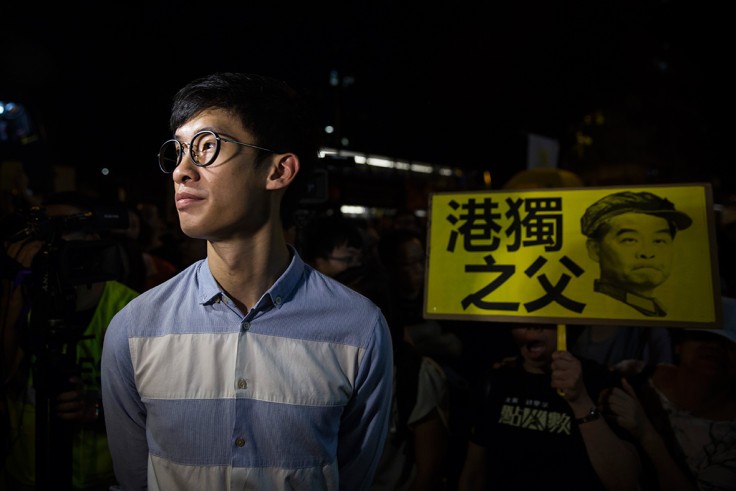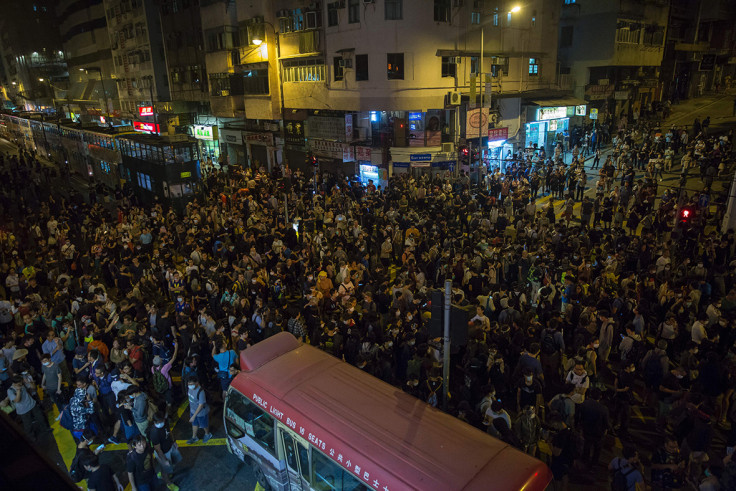Legal profession in Hong Kong rallies in new pro-democracy silent march against China
China's top legislative panel said two pro-independence lawmakers should be barred from office.
A 'sea of black' was spotted on the streets in Hong Kong, as at least a thousand black-clad representatives of the legal profession rallied against what they perceive as Beijing's interference in Hong Kong's rule of law.
The protesters gathered in front of the High Court at 5.30pm local time (09.30am GMT), where they faced off against a smaller group of not-so-silent pro-China supporters, who were chanting slogans and shouting on the microphone, before starting to march down to the Court of Final Appeal.
A silent march on 8 November is the fourth to take place since 1997, when the former British colony was handed over to the China. It follows the highly controversial involvement of the Standing Committee of the National People's Congress (NPCSC), China's top legislative panel, in interpreting article 104 of the Basic Law, the city's Beijing-approved constitution, which is at the heart of a court case against two pro-independence lawmakers.
The Hong Kong government called for an unprecedented judicial review into the recently-elected Youngspiration lawmakers, Yau Wai-ching and Sixtus 'Baggio' Leung, who took their first oath-swearing ceremony as an opportunity to advocate for Hong Kong independence from the People's Republic of China, which they mispronounced in a derogatory way. They have since been prevented from taking the oath again, despite repeated attempts.
On 7 November, the NPCSC ruled that the two lawmakers should be barred from office if their first oath-taking attempt is found to be invalid. While the Hong Kong court has heard the arguments, it has yet to make a decision – but Beijing's interpretation of the law is able to overrule whichever verdict is reached.

China's intervention is seeing as a breach of the "one country, two systems" agreement between the two entities, which guarantees Hong Kong some civil liberties, such as freedom of speech and a degree of legislative autonomy, until 2047.
"I am expecting a good turnout rate for the silent march this evening. The legal community, as well as the general public, have expressed grave concerns and disapproval with the NPCSC's interpretation," pro-democracy lawmaker of the Civic Party and one of the silent march organisers, Dennis Kwok, told IBTimes UK before the march began.
When asked whether the silent march can prelude large-scale anti-China protests as it did in 2014, Kwok said it would depend on how China's government, Hong Kong government and the pro-establishment camp dealt with Hong Kong people's demand for universal suffrage and high autonomy, and the dissidents' voices. "I believe that the hard measures adopted by the Chinese Government so far, including the NPCSC's interpretation, does not help resolve any issue but has heightened the tension between Hong Kong people and the Chinese government," he said.
Hong Kong legal profession's silent march against arbitrary and unnecessary use of power by the NPCSC to interpret the Basic Law #Oathgate pic.twitter.com/1eyv4pBJlI
— Missy Lao (@missy_lao) November 8, 2016
The most recent silent march was organised in June 2014, when lawyers dressed in black marched from Hong Kong's High Court to the Court of Final Appeal, standing in silence for three minutes to protest about Beijing's interference in the governance of Hong Kong. Back then, the silent march became the preamble to the massive pro-democracy rallies that took the city by storm from July to December 2014.
Pro-democracy demonstration took place in Hong Kong on 2 November, when Beijing's involvement in the Basic Law interpretation first became known, and again on Sunday 6 November. The Sunday demonstration saw as many as 10,000 people marching down the streets and ended in clashes with the police reportedly using pepper spray against the protesters, who gathered in front of the Chinese Liaison Office.

© Copyright IBTimes 2025. All rights reserved.






















